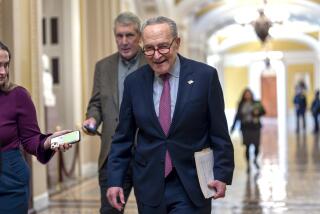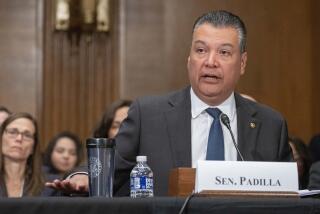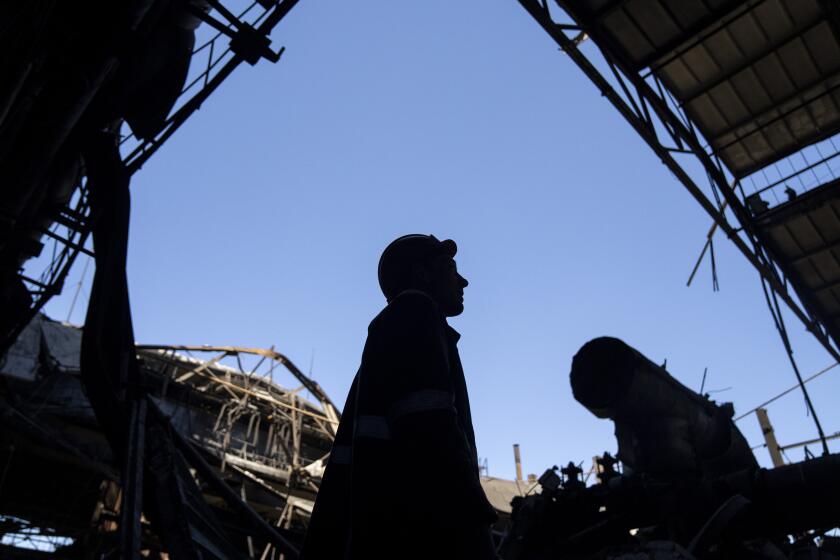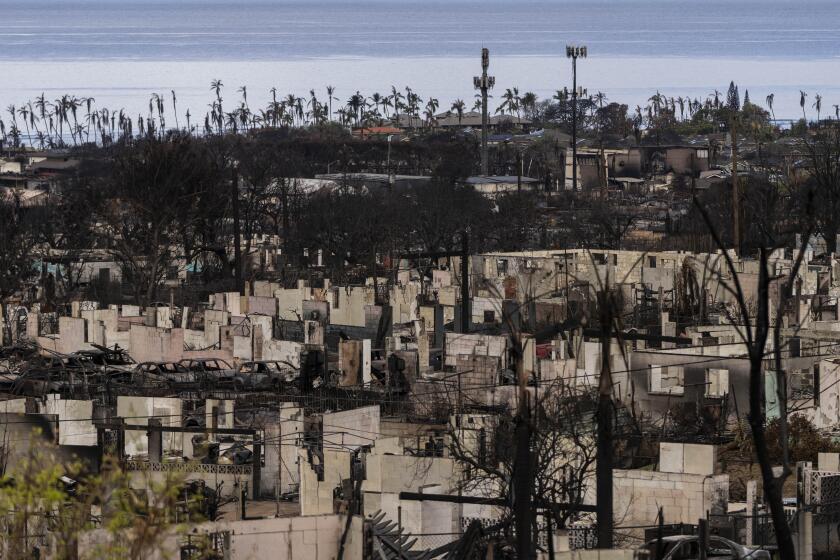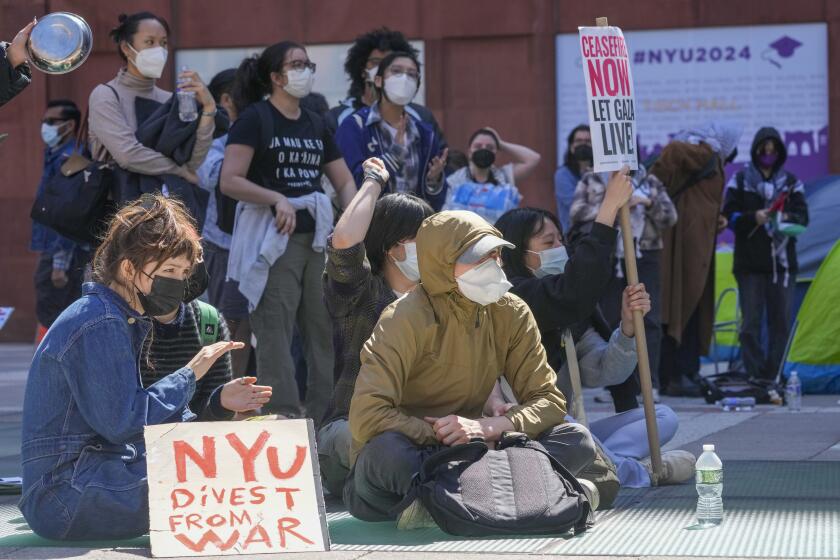Senate OKs Aid for Inner Cities : Legislation: The $2-billion plan includes $494.7 million for Los Angeles, Chicago. The vote was 61-36. Signs point to an accord on long-term urban assistance.
The Senate approved a $2-billion emergency urban aid bill Thursday, including $494.7 million in relief for victims of the Los Angeles riot and last month’s Chicago flood, as indications grew that Democrats and the White House are moving toward some agreement on long-term aid for cities.
The vote was 61 to 36, with 50 Democrats and 11 Republicans in favor and 31 Republicans and 5 Democrats opposed.
Opponents on the Senate floor denounced the bill as a “political Titanic” because it contains $1.45 billion for summer programs in cities across the nation, which President Bush did not ask for and the House version of the bill does not include.
But White House Chief of Staff Samuel K. Skinner told reporters Thursday that the Administration had put forward a compromise jobs proposal in talks Wednesday with Democratic congressional leaders on long-term urban aid.
“It’s now up to the Democrats to get back to us,” Skinner said in Cleveland, where Bush was making two campaign appearances.
House Speaker Thomas S. Foley (D-Wash.), at a session here with reporters, said only that Administration officials had sounded “a little sympathetic on the possibility of an expanded summer jobs program.”
A top Foley aide said Democrats were encouraged by the move and had taken the Administration’s proposal back to Senate and House task forces for study.
“We will try to narrow our proposals to (spending) levels that they are likely to accept,” said the aide, who spoke on condition that he not be identified. He suggested that the bargaining over summer youth jobs could form the basis for agreement on a long-term aid package.
Congress’ next move probably will come in a House-Senate conference committee, where members would put together a bill with the $494.7 million plus some money for summer programs. A final bill is expected to be sent to Bush around June 2, after Congress returns from its Memorial Day recess.
The House approved spending the $494.7 million last week. The money would go for emergency disaster grants and loan subsidies.
The legislation also would make available even more emergency aid in the form of $500 million in Small Business Administration disaster loans. Those funds are not an issue in debate between the White House and the Democrats.
The additional $1.45 billion in the Senate bill, inserted by Sens. Edward M. Kennedy (D-Mass.) and Orrin G. Hatch (R-Utah), would provide $700 million for summer youth jobs, $250 million for summer Head Start programs, $250 million for summer school for disadvantaged students and $250 million for the “weed and seed” program to reduce crime and establish social services in inner cities.
Kennedy declared that the funds would signal that “the night of neglect is ending and the dawn of hope is beginning.”
Sen. Trent Lott (R-Miss.) called the bill “a political Titanic, beginning to sink from the sheer weight.”
“This is an emergency disaster bill. Why are we piling on?” he asked.
But the Senate Appropriations Committee chairman, Sen. Robert C. Byrd (D-W. Va.), pointed to emergency spending declarations, already passed, that sent money to foreign countries and forgave $11 billion in foreign loans.
“Why can’t we find emergency funds for our own people? Why can we always find emergency funds for every other country?” Byrd asked. “This Administration wants to put $200 billion into a space station--a space Titanic. Somebody better wake up. Our problems are right here at home.”
A senior Administration official said he believes that an agreement can be reached with lawmakers on the summer jobs component of the spending measure. But he described the Kennedy-Hatch proposal as “ill-conceived” and said the White House favored an approach that would target such assistance more narrowly to individuals and communities in the greatest need.
Differences appeared to narrow when Kennedy accepted a late-hour amendment that was offered by Senate Minority Leader Bob Dole (R-Kan.) and Sen. John Seymour (R-Calif.). The amendment would allocate $100 million to the 75 largest cities and give states greater flexibility in dishing out much of the other money.
By a surprising vote of 57 to 42, the Senate rejected an attempt by Sen. Strom Thurmond (R-S.C.) to apply the federal death penalty to murders committed by rioters.
Over the last few years, the Senate has voted repeatedly to increase the number of federal offenses eligible for capital punishment, so that a pending anti-crime bill totals more than 50.
But Sen. Howard M. Metzenbaum (D-Ohio), citing a highly publicized execution Wednesday night of a convicted Virginia murderer who had proclaimed his innocence, fought the amendment in an impassioned speech. He charged that the measure would fuel racial tensions instead of promoting healing.
“There were no cries to expand the death penalty after Rodney King was brutally beaten by four white police officers,” he said. “But the moment there is violence in the African-American community that affects white communities, the all-white Senate is quick to expand the death penalty.”
Thurmond retorted: “If you want to stop this rioting and murders, then pass this amendment.”
Seymour voted for the measure, while California’s other senator, Democrat Alan Cranston, opposed it. Earlier, Seymour won adoption of an amendment to prohibit the use of aid money to provide loans or grants to anyone convicted of committing a riot-related crime during the Los Angeles disturbances.
Cranston opposed that amendment, too. But both senators voted for the overall bill.
Meanwhile, a group of mayors pressed for more federal aid in a meeting with House Majority Leader Richard A. Gephardt of Missouri, the Democrats’ lead negotiator in talks with the Administration.
Boston Mayor Raymond L. Flynn, president of the U.S. Conference of Mayors, urged adoption of the $1.45-billion Kennedy-Hatch proposal and pushed for $1 billion in law enforcement aid, $3.6 billion in additional transportation funds and a large enterprise zone program of tax breaks for businesses and first-time home buyers. In another development, Bush moved to maintain a high profile in post-riot Los Angeles by naming a White House official, David J. Beightol, to take charge of on-the-ground recovery efforts.
More to Read
Start your day right
Sign up for Essential California for news, features and recommendations from the L.A. Times and beyond in your inbox six days a week.
You may occasionally receive promotional content from the Los Angeles Times.

